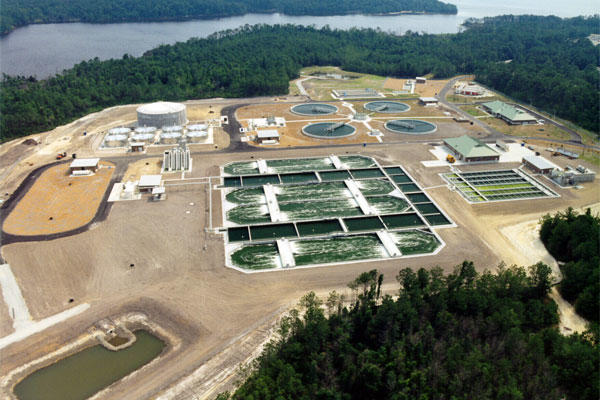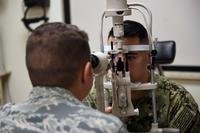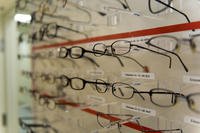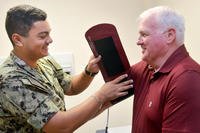 Military Update: The Department of Veterans Affairs expects up to 15,000 seriously ill veterans who served at Camp Lejeune, N.C., before 1988, when base drinking water was contaminated, to be helped by a faster-track compensation process proposed last month.
Military Update: The Department of Veterans Affairs expects up to 15,000 seriously ill veterans who served at Camp Lejeune, N.C., before 1988, when base drinking water was contaminated, to be helped by a faster-track compensation process proposed last month.
But the promised acceleration in VA disability awards can't begin until the proposed regulation becomes final, which could take at least another year to complete, VA officials said in a phone interview Tuesday.
In this case, time is money. Every month that passes before a final regulation takes effect is a month of compensation lost to ailing veterans of an older generation, most of them Marines.
VA Secretary Bob McDonald announced in mid-December that eight medical conditions afflicting vets who served at Lejeune from August 1, 1953, through Dec. 31, 1987, are to be presumed the result of exposure to carcinogens and other harmful chemicals that fouled base water systems.
The proposed "presumptive" diseases are: kidney cancer, liver cancer, non-Hodgkin lymphoma, leukemia, multiple myeloma, scleroderma, Parkinson's disease and aplastic anemia/myelodysplastic syndromes.
Making ailments presumptive moves compensation awards nearer to automatic. Diagnosed veterans still must file claims but they only need to show they served at Lejeune during the 34-year span for a necessary length of time. A minimum of 30 days is likely although officials won't confirm that until a proposed regulation is published, which is expected by mid-2016.
Without presumption, claims are adjudicated more slowly, with each claimant having to show a nexus between their disease and their service.
The Navy Department estimates that 900,000 active duty and reserve component personnel were assigned to Lejeune while water was being contaminated by nearby storage tanks and a dry cleaning business. Roughly 500,000 of these veterans are believed still alive.
Based on the prevalence of such illnesses in a population of that size, VA estimates fewer than 15,000 vets will qualify for compensation under the proposed regulation. Also, 5000 survivors of deceased veterans are expected to qualify for death benefits due to these presumptive illnesses.
Three senators rightly claim some credit for this. Last July Sen. Johnny Isakson (R-Ga.), chairman of the veterans' affairs committee, and Sens. Richard Burr and Thom Tillis, Republicans of North Carolina, met with McDonald and the director of the Agency for Toxic Substances and Disease Registry. Work by the ATSDR has confirmed harmful levels of exposure at Lejeune to trichloroethylene, tetrachloroethylene, vinyl chloride and benzene.
After listening to senators and reviewing the science, McDonald that day told participants he wanted to create a list of presumptive illnesses linked to long-ago service at Lejeune to speed the claim process.
Brad Flohr, senior advisor for compensation services at the Veteran Benefits Administration, attended the meeting. When asked, Flohr advised McDonald and senators that a regulation establishing new presumptive ailments typically takes two years to produce. McDonald said that was too long. So VA is striving to compress the process by six months or more. It did so once before, in 2009, when then-Secretary Eric Shinseki added heart disease, Parkinson's and B-cell leukemia to the VA list of illnesses presumed caused by Agent Orange exposure in Vietnam, Flohr said.
"The secretary has pledged we will do the same with this," Flohr said.
Since January 2011 more than 20,000 veterans have filed claims citing environmental hazards at Lejeune. Of the 13,213 veterans given decisions through November last year, only 864, or 6.5 percent, were granted compensation for illnesses tied to having served at Lejeune.
Almost 8000 of these veterans are receiving VA compensation already for other service-connected conditions. So many Lejeune claims have been denied, Flohr said, because ailments claimed are not linked to the pollutants.
"Over 90 percent of claim issues are conditions that have nothing at all to do with the contaminants in the water," Flohr said. "They claim hearing loss. They claim tinnitus. They have some idea they should file a claim for anything they have."
What has angered veterans and lawmakers, however, is the number of claims rejected for conditions has linked to Lejeune's water. Senator Burr complained that the VA was making "ridiculous" use available science.
VA has tracked claim outcomes for six of the eight diseases on the proposed presumptive list. Of 2039 claims filed so far, only 311, or 15 percent, have been approved. When the proposed regulation takes effect, the approval rate for these conditions should jump toward 100 percent.
Jerry Ensminger, a retired Marine Corps master sergeant who has led the fight for compensation and care of those exposed to poisons at Lejeune, criticized the proposed list of presumptive illnesses for excluding bladder cancer. The ATSDR gave VA a report last October, he said, that found "sufficient evidence" water at Lejeune caused a higher incidence of bladder cancer, just at it found evidence of causation for kidney and liver cancer.
Perhaps it's no coincidence, Ensminger asserted, that among cancer claims filed by Lejeune vets, bladder cancer leads all others with 885 cases.
But Dr. Ralph L. Erickson, director of Pre-9/11-era Post-Deployment Health for the Veterans Health Administration, said VA is obligated to look at more than ATSDR findings to decide on presumption. He noted two recent mortality studies that "failed to identify an increased risk of bladder cancer mortality" in Marines or in civilians at Lejeune during the period of contamination. One found Lejeune Marines 23 percent less likely to die of bladder cancer than Marines never assigned there, Erickson added.
Erickson, a physician trained in preventive medicine and public health over a 32-year active duty Army career, came to VA two years ago. After the July meeting, he led a VA technical work group that recommended the list of presumptive diseases for McDonald. The group, he said, "felt that the weight of the evidence was not sufficiently strong to recommend a presumption for bladder cancer at this time," but more research is needed.
"Our secretary," Erickson said, "wanted his proposal for these new presumptions to be well-rooted in evidence."
VA concurred on much of what the ATSDR reported, he said. But with a few ailments VA had "a professional difference of opinion as to the strength of the data."
More information for Lejeune veterans and survivors is online at: www.publichealth.va.gov/exposures/camp-lejeune/. VA continues to review Lejeune claims. However, for claims that would be denied under current regulations, decisions are being stayed until new regulations are made final.
Send comments to Military Update, P.O. Box 231111, Centreville, VA, 20120, email milupdate@aol.com or twitter: Tom Philpott @Military_Update
# # # #
Tom Philpott has been breaking news for and about military people since 1977. After service in the Coast Guard, and 17 years as a reporter and senior editor with Army Times Publishing Company, Tom launched "Military Update," his syndicated weekly news column, in 1994. "Military Update" features timely news and analysis on issues affecting active duty members, reservists, retirees and their families.
Visit Tom Philpott's Military Update Archive to view his past articles.
Tom also edits a reader reaction column, "Military Forum." The online "home" for both features is Military.com.
 Tom's freelance articles have appeared in numerous magazines including The New Yorker, Reader's Digest and Washingtonian.
Tom's freelance articles have appeared in numerous magazines including The New Yorker, Reader's Digest and Washingtonian.
His critically-acclaimed book, Glory Denied, on the extraordinary ordeal and heroism of Col. Floyd "Jim" Thompson, the longest-held prisoner of war in American history, is available in hardcover and paperback.




